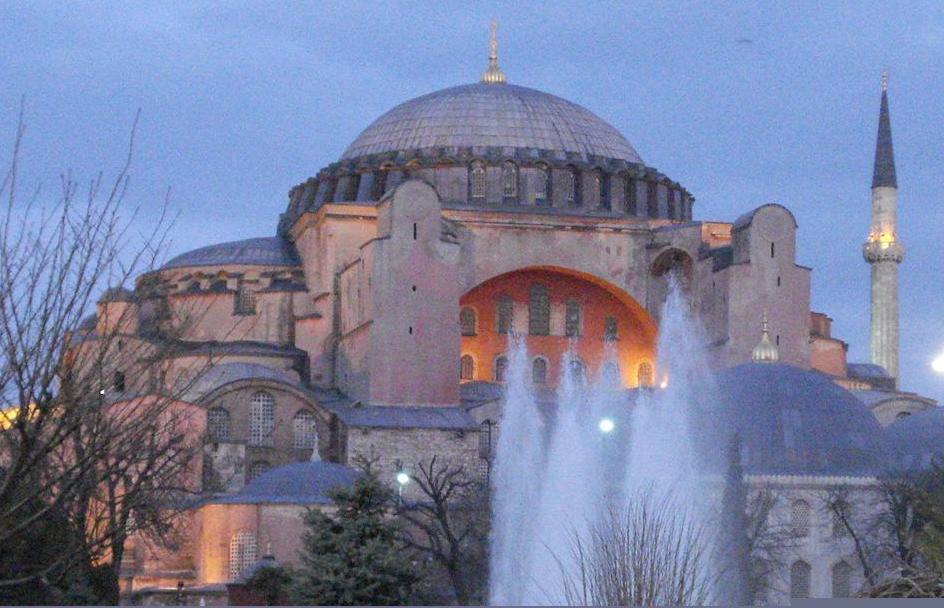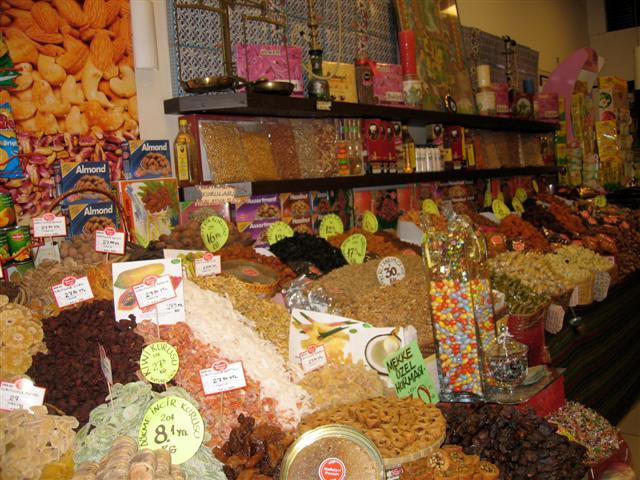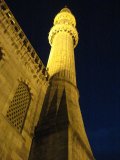IN THE DREAM ABOUT YESTERDAY AND TOMORROW – TURKEY
Karolina Markocka
Turkey is the only muslim country where law and religion are divided and said to be two different life domains. Thanks to constitution the question of interpretating traditional law that can be found in Koran isn’t raised. Religion already cannot place a veto towards decisions of president or Prime Minister. Obviously nothing happens by itself. Also transforming a traditional country into the modern one wasn’t an easy thing to do.
The name of a man who became an inspiration for changes – of whom turkish people are truly proud calling him the greatest turk that turkish soil ever revealed – is Mustafa Kemal Ataturk(1881-1938). Each turkish child knows his biography. Kemal is his second name that gad been given to him by his mathematics teacher in recognition of his academic excellence (meaning Perfection or Maturity). Later on he became a soldier, then a general and at last he obtained a Pasha title. It was during the First World War while defendning Gallipoli peninsula against invasion of English, Australian, French and New Zealand armies which made him famous. During that fight he said to his soldiers „I do not command you to fight, I command you to die. In the time it will take us to die we can be replenished by new forces”. People were respecting him for his bravery and for the fact that he was a real fighter and never lost hope. But his most important characteristic was his charisma thanks to which millions of people followed him calling Ataturk-the Father of Turks-. Ataturk overthrew kalifat (religious institution which ruled the country) and Ottoman Empire, became president, named the country Republic of Turkey and reformed it in 1923. These weren’t kind suggestions implemented little by little. These were orders and totally new principles that meant to change the country and its people dramatically. Law, alphabet, calendar, tradition and everyday lifestyle was changed literally in one day. Latin letters instead of arabic ones, new law for women, suits and hats for men, cigarettes in place of water pipes. Traditional man dress became forbidden, women also were told to show their faces and hair especially when working for national institutions. That was a real revolution! We can call Ataturk a dictator but as a matter of fact a positive one as still loved by his countrymen. We can find his portraits and photographs in every institution, in many shops and blocks of flats.
Nowadays Turkey is one of a kind mosaic, it’s like a multilayer cake with hundreds of flavours inside. Influences of Greek and Roman culture, later Arabs and their rich traditions, nomadic people crossing the country – each of them left unique sign and trace. Finally land became inhabited by Turks and Christians. All of them had thousands of years for development which now seem to be one minute. So they came and gone, they were fighting and living together, they left marveous pieces of art and human’s thought. This is one of many reasons why the country is so magical. Another one is that Turkey is situated in the Middle East – somewhere in the middle of Europe and Asia, not mentioning Istanbul(historically Byzantium and later Constantinople) which is a mysterious metropolis, the only one in the whole world situated on two continents in the same time. So geographically it is rather an asian country but mentally rather european one – this is Turkey.
10 characteristics of Turkey:
1.Turkish hospitality.
People in Turkey are open and friendly. They are so hospitable that you can even find turkish expression describing people who keep their doors open –misafirperver – that means –guest lover -. People in Turkey are always ready to help you anyway (especially if you are a foreigner). Also don’t be surprised if children and teenagers call you abla (elder sister) or abi (elder brother). This kind of directness is natural and it is a sign of respect to you. So when you find yourself in everyday common situations like shopping on bazaar etc. you can hear other people calling elder women teyze (aunt) and elder men amca (unckle).
Don’t be ashamed to ask for a piece of bread if you are hungry because it will be given to you. It’s also natural when your new turkish friends invite you for a family dinner to their house. That would be nice to give something to them(except for a bottle of wine as such a gesture could be misunderstood). I would recommend buying something neutral like sweets or chocolates – never too much of it in turkish house -. Before entering turkish house or flat remember to take off your shoes, often already in the front of the entrance door. Thanks to many pairs of shoes that can be seen next to each door you don’t have to guess the number or age of each family member. While disputing it’s important to get rid of all stereotypes people grew up with Although it is difficult try to become a white, clean sheet of paper. You will be understood if people see that you try to understand them. Otherwise, if you start to ask embarassing, rude questions, you can be misunderstood and that would be a lack of respect. But as a matter of fact the best advice is to be natural , to do what your heart tells you to do. If people see that things you say is truly what you feel, they will open their hearts too and become your honest friends. Stil, if your life motto is when in Rome do as the Romans do and you want to show your esteem you should bend down towards the oldest man or woman sitting in the room, then kiss his/her hand touching it with your forehead. They will love you.
2.Turkish cuisine.
Turkish cuisine is a topic wide and deep as sea. There are as many different starters (called meze), soups, main dishes, salads and desserts as villages and as many variations of them as many families in Turkey. Courses are delishes as products are fresh, natural and of course made in Turkey, recipes are unique, moreover chefs do their best to make you eat your fingers (parmaklarini yersin). Most popular dishes are kebab(minced meat or cubes of meat on a skewer, usually marinated before cooking.), doner(meat cooked on a vertical spit and sliced off to order. The meat may be lamb, mutton, beef, goat, or chicken), pilav(a dish in which a grain, such as rice or cracked wheat, is generally first browned in oil, and then cooked in a seasoned broth with vegetables and herbs), lahmacun(usually made up of a round, thin piece of dough topped with minced meat-most commonly beef and lamb. Lahmacun is often sprinkled with lemon juice, and then served rolled up with pickles or other vegetables, including tomatoes, peppers and onions.), manti(small dumplings –not bigger than ravioli with meat inside, eaten with garlic yoghurt sauce and fried spices ), mercimek corbasi(lentil soup made of stock and lentils with onions carrots and celery), icli kofte(meatballs filled with spices and nuts), and a hundred of others that obvoiusly cannot be mentioned here because it is a topic for long studies. Most popular desserts are sutlac(a pudding-style dessert made from rice, milk, and eggs), baklava(pastry traditionally made with phyllo dough, honey, nuts, and orange essence), helva(a dessert made of sesame seeds and sugar or a simpler home-made variation is prepared by flour, butter and sugar. Helva may also be made from a variety of other ingredients, including sunflower seeds, various nuts, beans, lentils, and vegetables—such as carrots, pumpkins, yams, and squashes), lokum(Turkish Delight, lokum, or loukoum is a confection made from starch and sugar, contains various nuts, sesame seeds, fruits, black or white chocolate etc.). The thing that can surprise you is that even if you see a table in the house, dinners in Turkey are often eaten on the floor. A special clothing, then plates and dishes are put on a carpet. It is called sofra-both a table or floor covered with table cloth prepared for a dinner. A traditional turkish dinner is very colourful and it consists of many dishes that’s why if you are invited to a turkish house that would be nice if you offered your help taking plates and food from the kitchen. Then just sit comfortable like all the family do and prepare your stomach for the feast of your life-especially if the dinner starts at 9 p.m. and lasts till 11 p.m. Celebrating is very important. For desserts usually you can expect very sweet cakes, sweets and traditional pastries or simply fruits. After dinner it’s kind to say to the person who prepared the food – ellerinize saglik (ellerinize saalyk)which means may your hands be healthy and then she would reply afiyet olsun! – have a nice meal. Turks use “bon appetit”(afiyet olsun) after meal, not before.
3.Turkish weather.
Turkish weather and climate differs according to regions so it depends on where you are but generally speaking it’s hot and sunny. The warmest place is Adana – a city where not only you can find the biggest mosque in Turkey but it is also the biggest producer of watermelones, oranges, peaches, corn and many other fruits and vegetables. Sun and turkish climate has got a very positive influence on culture and society – people smile more often and life starts after 9 p.m. thanks to which you can feel that you are really live, not only awaiting for another day to come. There are many more benefits of sunny weather in Turkey and that is connected with its lanscape and nature which has to be seen, not described.
4.Ezan’s prays.
fot. K. Markocka
Ezan, in Europe known as muezzin is a man who used to announce religious truth from the top of the minaret 5 times a day. Now he does the same but using microphone and loudspeakers which are attached to the minaret. His voice and the way he modulates it are things that can take you into a different state of spirit even if you aren’t a muslim. If you are looking for unique feelings sit between two famous mosques in Istanbul which are Hagia Sophia and the Blue Mosque in the time of two ezans praying. It’s a mysterious experience to hear two voices entering into a religious ecstasy, “talking” to each other and exchanging same sentences but said in an individual manner. In your back, in the front, from your right and left, you can hear stronger and weaker voices mixing and blending, interspersing one another at last those being only a silent echo.
5.Turkish moon.
It’s obvious that Earth has got only one Moon but saying “turkish moon” I want to underline its special character. Maybe it sounds crazy but its shape often becomes very thin and it is turned upside down. Whenever I go to Turkey I can see its Oriental face which I can hardly observe here in Europe. You can call it exaggeration or immagination – go ahead but before you do that go to Middle East and look at the sky in the night.
6.Turkish music.
Turkish music is one of a kind because ot its style, instruments and special technics of singing taken from religious styles. This kind of music seems to be so different and so Oriental to us because it is strongly influenced by arabic music where crotchets are used more often than for example in Europe where we can observe domination of minims. That’s why turkish music sounds in such a mysterious way. To mention types of music nowadays we can hear more traditional styles like arabesque, fantasy, belly dancing music and turku which is a kind of folklore nevertheless it is still often played, especially popular in tv programmes. Naming more modern styles also Anatolian rock, pop-rock, pop, rock and hip-hop should be mentioned. The funny thing is that even so called pop or rock in Turkey has got such a turkish tone that sometimes you can hardly recognize its proper style. But if I were to find something that all those styles have in common I would say – they are all emotional and romantic. Even those rock songs contain crotchets which right away touch sensitive part of our souls. Why is that? Maybe because turkish language is a good material for such songs as many people already regarded its sweetness, ideal for love songs. Also turks are very emotional people so it is a natural tendency to reveal what is deep inside their hearts right by music. Once you become a famous singer your life changes dramatically and you become almost a king. It’s because making good music in Turkey or singing very well, I mean emotionally well means feeding turkish sensitive souls and that means that you won’t pass by unseen!
7.Turkish coffee.
Turkish coffee is far different from to what we got used to and what we call coffee. Preparing turkish coffee is a real ceremony that has to be learned. It is infused in a narrow-topped small boiling pot called cezve according to a special procedure. The size of the pot is chosen to be close to the total volume of the cups to be prepared while the teaspoon is used both for stirring and measuring the amount of coffee and sugar. For best results, the water must be cold. After it‘s done should be poured into tiny, beautifully decorated caps (fincan). A well-prepared Turkish coffee has a thick foam at the top. It is usually drunk together with friends or a family with a piece of lokum aside. Coffee should be strong and sweet. After drinking it you can put the cup on a plate turning it upside down, then wait a few minutes. That is a way to get to know what your future would be. Of course only if there is a girl who can read from dregs.
8.Women wearing head scarfs.
The picture of women wearing head scarfs is common in Turkey. It doesn’t mean that they are backward or they aren’t civilized as unfortunately some people think. So why? People who keep asking questions like this and who wonder, who try to solve unsolvable issues are rather naive if they think that they can find a pure, logical answer. Culture is culture and there is less to understand but more to accept. Many of them do it for faith as so is written in Koran, quite a big part of women don’t show their hair after getting married-it’s is a sign for other men that she should stay untouched. Turkish women don’t suffer for this reason, it’s a part of tradition in which they are raised. They observe their grandmothers, mothers and aunts wearing head scarfs so they don’t have any problems putting scarfs themselves when the time comes. Of course nowadays some girls born in traditional families try to persuade their husbands or fathers to leave out tradition and they stay open. But still for many turkish girls wearing head scarf is as natural as not wearing it for european women.
9.The way of expressing emotions.
Indeed, emotions take a very important part in turks’ life. They express themselves in a vivid manner, sometimes tend to exaggerate. Ok, let’s facet the truth. Some people exaggerate quite often-they like to describe their sicknesses as more serious and painful that they really are, they like to relate what happened in the family, about hard life and so on. That’s why sometimes turkish series aren’t far different from everyday life. Obviously you never know what to think about what you hear for this reason never judge people before you get to know them better.
10.Pure magic.
Summing up Turkey today varies and it is still a mixture of Otoman Empire’s history and modern times. That’s why it is one of a kind. Its landscape, art, architecture, influences of islam and great men who reformed the country, delicious food, music, literature, philosophy and poetry, hospitality, finally ezan’s voice, a view of a donkey in the middle of Istanbul, the music of turkish language in your ears, sun and moon-both mysterious. All of these things and a lot more help to make up your mind and call this country unusual and simply unspeakable.
o autorce:
Pani Karolina Markocka od 2006 r. studiuje filozofię z WOS na Akademii Pedagogicznej im. KEN w Krakowie, jest an III roku, od 2004 roku swoje zainteresowania skupia na kulturze Turcji.



